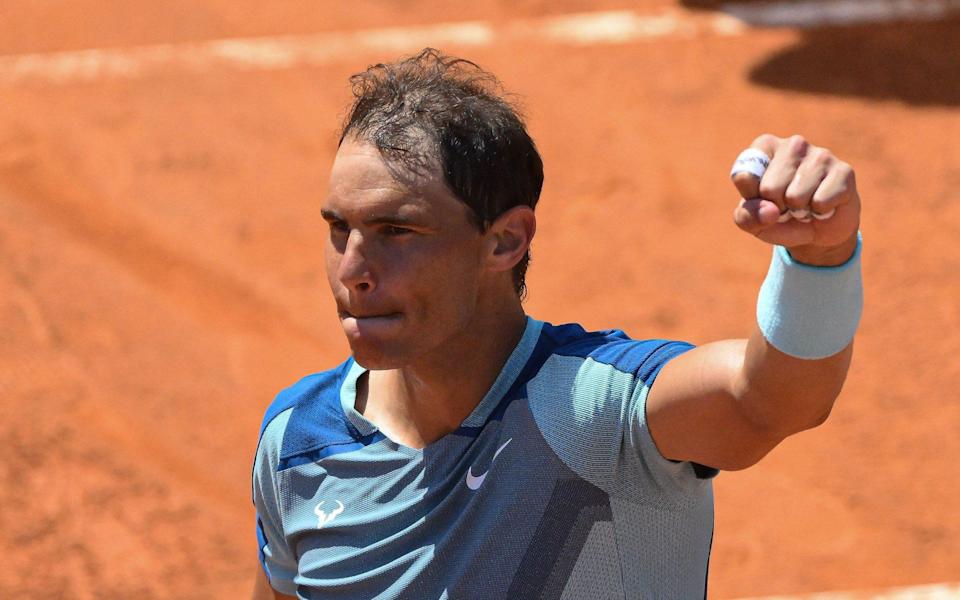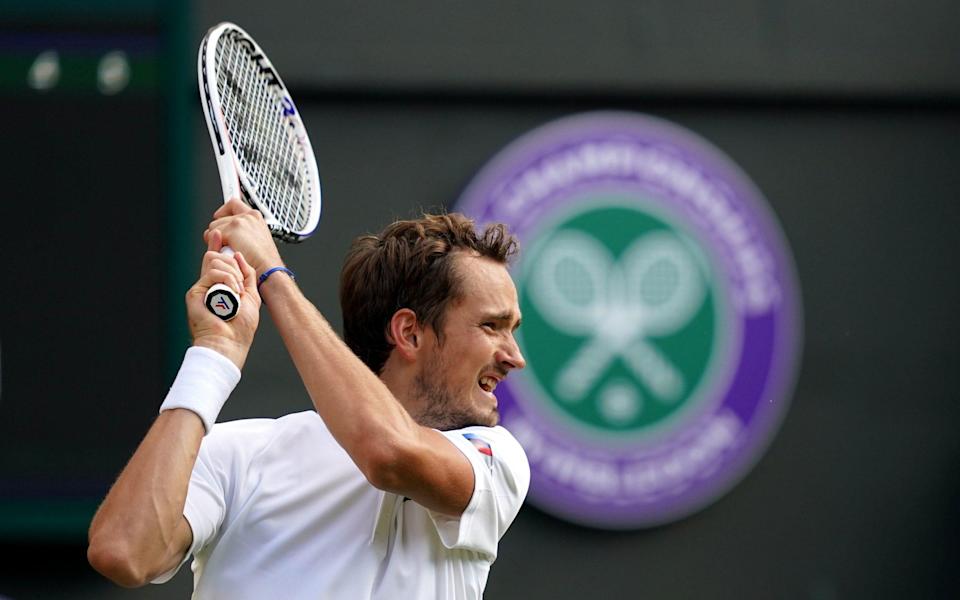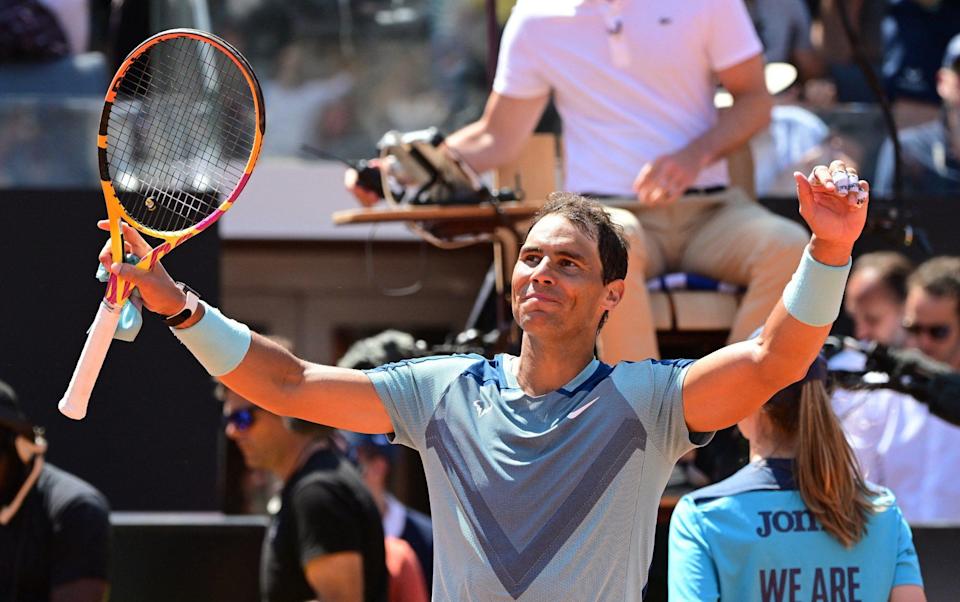
A defiant Rafael Nadal proclaimed it was his “job” to defend banned Russian and Belarusian players after the ATP Player Council called for Wimbledon to be stripped of ranking points.
The record 21-time grand slam champion intervention comes amid an increasingly-toxic row between players, the All England Club and politicians over the decision to ban Russians and Belarusians from this summer’s Wimbledon, in the wake of the invasion of Ukraine.
Nadal, who last week said it was “unfair” to bar the likes of Daniil Medvedev, refused to disclose details of “private conversations” between him and his colleagues or reveal whether he backed stripping Wimbledon of ranking points.
But he added: “[The] only thing we can do is be in touch with Wimbledon and the rest of the ATP management to do the things that work better to protect every single player in the ATP.
“At the end, that’s our job: to protect the players and to work [to] the benefit of every single player that we are representing.”
Nadal resisted pressure to “come clean” about what part he and Roger Federer played in the ATP Player Council reaching a position on the Wimbledon ban, one which the All England Club views as a clear attempt to penalise it for its stance.
Indeed, the player council could have instead called for Russian and Belarusian players’ points to have been frozen in the same way as if they were injured.


Chris Bryant MP, the chair of the All-Party Parliamentary Group on Russia, said: “Federer and Nadal should come clean. Do they want Vladimir Putin to fail or don’t they care?”
Recommendations by the 10-strong player council are not binding on the ATP, which condemned the Wimbledon ban when it was imposed last month.
But insiders feel its board has little choice but to take their advice on this issue during meetings this week, when a vote could take place.
Bryant added: “The men’s tour are behaving appallingly. It’s like they haven’t heard what is happening in Ukraine or don’t care.”
Clive Efford MP, a leading member of the Digital, Culture, Media & Sport select committee and a former shadow sports minister, said: “The ATP needs to take a look around and appreciate how the rest of the world outside its bubble will view it for sanctioning Wimbledon for supporting Ukraine.”
A source with knowledge of the player council’s position said it had been made with the “integrity of the rankings” in mind but was unable to explain how stripping Wimbledon and the UK’s other grass court tournaments of ranking points better achieved that than a freeze.
Nadal also refused to be drawn into a debate on the issue, saying: “When things like this happen, nothing will be perfect.”
Another source with knowledge of the crisis talks between the All England Club and the ATP questioned the motives behind what appears an act of self-harm by players.
“This feels like penalising the many for the sake of the few, just to make a point,” said the source, who warned the All England Club had no intention of lifting the ban.
Wimbledon bosses suffered a blow last week when Sir Andy Murray, himself a member of the ATP Player Council until recently, refused to back its stance, saying: “I don’t support one side or the other.”
A representative of Murray said he would not be commenting further on Wednesday.
Wimbledon is not the only UK tournament which is set to lose its ranking points, with the cinch Championships at Queen’s Club or the Rothesay International at Eastbourne also in the firing line.
While Wimbledon’s prestige ensures players will still attend en masse, Queen’s and Eastbourne could suffer if they lose their ranking points as they clash with grass tournaments in Halle and Mallorca respectively. Neither of those have followed the LTA in imposing bans,
The All England Club, LTA, ATP and Government all declined to comment on Wednesday on the ongoing crisis.
But in an interview with the Evening Standard conducted before news of the player council’s position emerged, sports minister Nigel Huddleston said: “We completely supported the decision that Wimbledon made. While I understand there is some pushback from some players and governing bodies, I can tell you it’s got overwhelming support from the population. People understand exactly why they’ve done that.”
The WTA declined to comment on its own stance on stripping Wimbledon of ranking points.
The view from inside the locker rooms of world tennis
By Molly McElwee
A band of united male players are taking on the biggest tournament in tennis, and the evidence so far suggests they have no intention of backing down.
The player-led push to remove ATP ranking points from Wimbledon, in protest of what they deem as the unfair exclusion of Russian and Belarusian players, is the ultimate power move. Beyond a boycott, this was the worst case scenario the All England Club could have imagined when they took the decision last month to break away from the sport’s more measured approach towards players caught up in Putin’s war.
If it goes through, with a final decision from the ATP board expected imminently, it will leave a stain on proceedings this summer.
The players’ move has been perceived by some as a selfish one, in the face of death and destruction happening in Ukraine. But the stance does show that they are working as a true collective, a rarity in a mostly individual sport governed by multiple tours and organisations always working primarily towards their own interests. It is no small sacrifice either. The ranking points will be a major loss to many of the players’ professional goals, as a good showing at a grand slam event can change the trajectory of their season, but they seem to have adopted a ‘no man left behind’ stance so far.
Nadal embodied that on Wednesday, in his attempts to batten down the hatches and put a zip on the story, first reported by Telegraph Sport on Tuesday. Now the most successful male grand slam champion of all time, Nadal’s voice is of ever growing importance on the tour and he is by far the most prominent person on the council. With Andy Murray no longer a member of the player council, Novak Djokovic exiting to form his own controversial breakaway union two years ago and Roger Federer still sidelined with injury, Nadal is the only one of the supposed Big Four actively fronting up the conversations going on behind the scenes.


Though usually less controversial than some of his contemporaries, he is not devoid of opinion and he voiced it when Wimbledon’s ban was first announced, calling it “unfair” on the players involved. But Nadal is also a player who does not engage in hearsay, and has lived his career by the book. Despite the story leaking, he had no intention of sharing any details from what he called “private conversations” among him and the rest of the council on this spiky issue and he was clearly rankled by the prying questions. But for all his furtiveness, he made clear the council’s goals remained centred on prioritising every single players’ best interests.
This was in stark contrast to the Australian Open’s Covid vaccination crisis, which gripped the sport. Then, world No 1 Djokovic received no unified council response, nor were there active steps made to defend him when confined to a detention centre and eventually deported. The key context was that he had already exiled himself from the council by forming his own union. It was also a situation taken out of tennis’s hands entirely by border force officials and the Australian government – a detail Wimbledon may argue rings true in this case too. Most importantly though, Djokovic had brought his predicament on himself by not getting vaccinated.
As a result the players had no qualms about speaking out either for or against his plight, Nadal in particular. He expressed obvious regret at the way the situation was handled and care for Djokovic’s wellbeing, but he was fully in favour of the world’s collective vaccination push, so his sympathies were understandably limited.
Meanwhile the Russian and Belarusian players have found themselves banished through no fault of their own, as they have no hand in this war. Any early suggestion they should denounce Putin’s regime in order to ensure entry to Wimbledon were wildly fanciful, considering the mortal danger that could have put them or their family in. The withdrawal of ranking points from Wimbledon – if it sticks – will send a message to those absent from Wimbledon that they have support in their colleagues.
And, though the WTA is yet to make their intentions public, the ATP players moving first on it can only spell more trouble on the horizon for the Wimbledon organisers.
